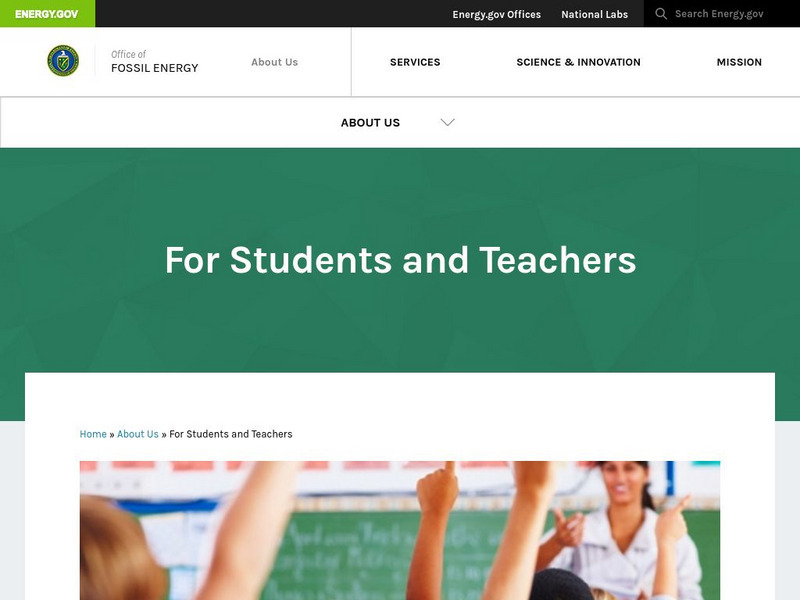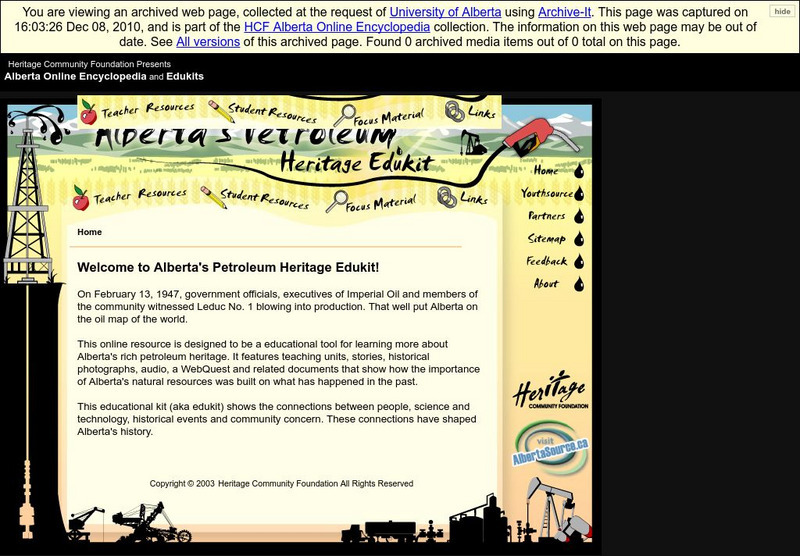US Department of Energy
Natural Gas: Fueling the Blue Flame
Natural gas is a colorless and odorless fossil fuel that is used in almost half the homes for heat. Learn more about this non-renewable energy resource.
TeachEngineering
Teach Engineering: Introduction to Environmental Engineering
Students are presented with examples of the types of problems that environmental engineers solve, specifically focusing on air and land quality issues. Air quality topics include air pollution sources, results of poor air quality...
PBS
Pbs Teachers: Exploring Alternative Energy Sources
Calculate the increased cost of heating homes and fueling cars since the energy crisis. Investigate alternative renewable and nonrenewable energy sources that can be used to decrease Americans' dependency on fossil fuels.
TeachEngineering
Teach Engineering: The Great Divide
In this activity, students will use cookies to simulate the distribution of our nonrenewable resources (energy). Then, they will discuss how the world's growing population affects the fairness and effectiveness of this distribution of...
TeachEngineering
Teach Engineering: Environment
Through 10 lessons and more than 20 hands-on activities, students are introduced to the concept of an environment and the many interactions within it. As they learn about natural and human-made environments, as well as renewable and...
US Energy Information Administration
U.s. Eia Energy Kids: Nonrenewable Energy Sources
This resource provides information about nonrenewable energy sources. There is specific information about each of these energy sources, and lots of maps, charts, tables, and graphs to further the understanding.
US Department of Energy
U.s. Department of Energy: Coal: Our Most Abundant Fuel
The U.S. has enough coal to last for the next 200-300 years. So why are we not using more of it? This article describes the different types or "ranks" of coal, the history, and the problems with burning coal for energy.
Council for Economic Education
Econ Ed Link: Be an Energy Saver
This lesson focuses on the scarce and non-renewable nature of fossil fuels in order to stimulate student thinking about energy conservation. It emphasizes the fact that saving energy can be good for the wallet as well as the earth's...
BBC
Bbc: Gcse Bitesize: Energy Demands
Electricity is a very convenient form of energy that can be generated using different energy resources. Some of these resources are renewable and some are non-renewable. Each resource has advantages and disadvantages. A link to a test is...
Alberta Online Encyclopedia
Alberta Online Encyclopedia: Alberta's Petroleum Heritage
An online resource designed to promote learning more about Canada and Alberta's rich petroleum heritage. It features teaching units, stories, historical photographs, audio, and a WebQuest.
Other
Cwec: Survival of the Fishes (Mini Unit) [Pdf]
Students will look at the needs of humans and of fish in this mini-unit to develop an appreciation of how important our water resources are.
Wikimedia
Wikipedia: Biomass
Learn about "biomass," organic non-fossil material of biological origin. Includes external links.
CK-12 Foundation
Ck 12: Earth Science: Materials Humans Use
[Free Registration/Login may be required to access all resource tools.] Just a few resources that we use for products that we like.
CK-12 Foundation
Ck 12: Earth Science: Materials Humans Use
[Free Registration/Login may be required to access all resource tools.] Just a few resources that we use for products that we like.
Scholastic
Scholastic: Study Jams! Science: Energy, Light and Sound: Fossil Fuels
A slideshow and a short quiz on the types of fossil fuels we use and the impact this has on the environment.
Council for Economic Education
Econ Ed Link: Fewer Watts and Fatter Wallets
Students learn about incentives for alternative energy programs and the role played by non-price determinants in energy choices.
TeachEngineering
Teach Engineering: Design a Recycling Game!
Students will design a game where players try to come up with alternative uses for used products. Students will brainstorm ideas for an effective board game format.
Other
Lehigh University: Energy
An inquiry-based science unit for middle school students centered on the world's energy sources. The lessons integrate technology and lab activities while teaching about energy sources, production, and consumption.
McGraw Hill
Mc Graw Hill Ryerson: Human Impacts on Ecosystems
Take this ten question quiz on human impacts on ecosystems. The quiz is multiple choice.
Other
Mackenzie Gas Project: About Natural Gas
This gives a brief explanation of what natural gas is and tells how it is formed, how we harness it and how much it takes to heat a home or an urban area.

















